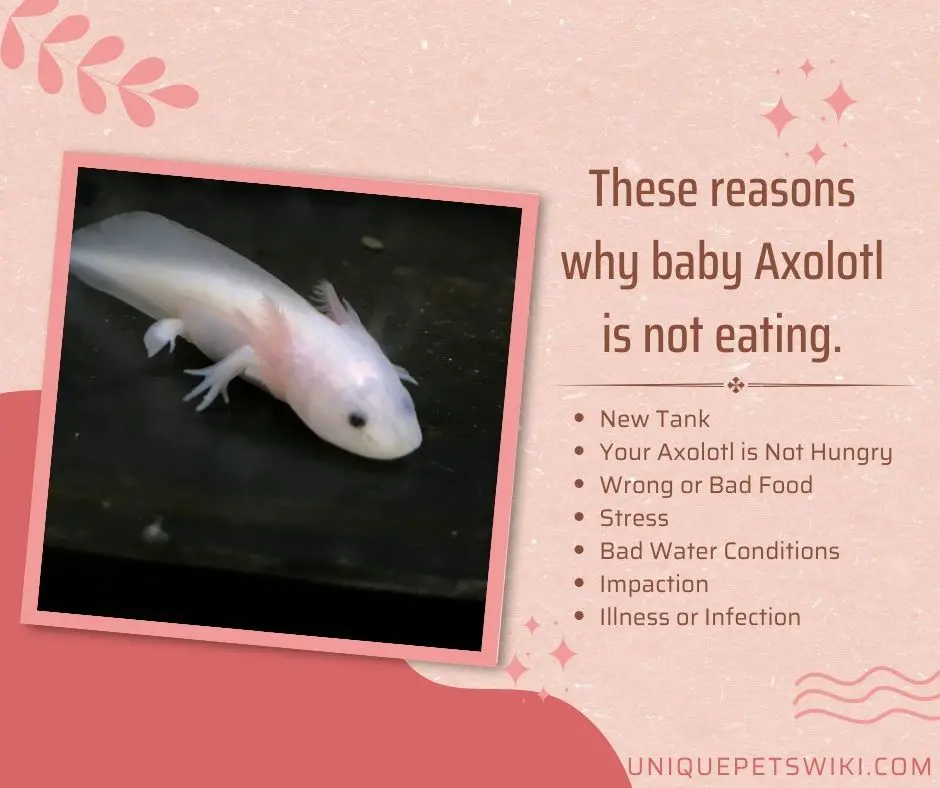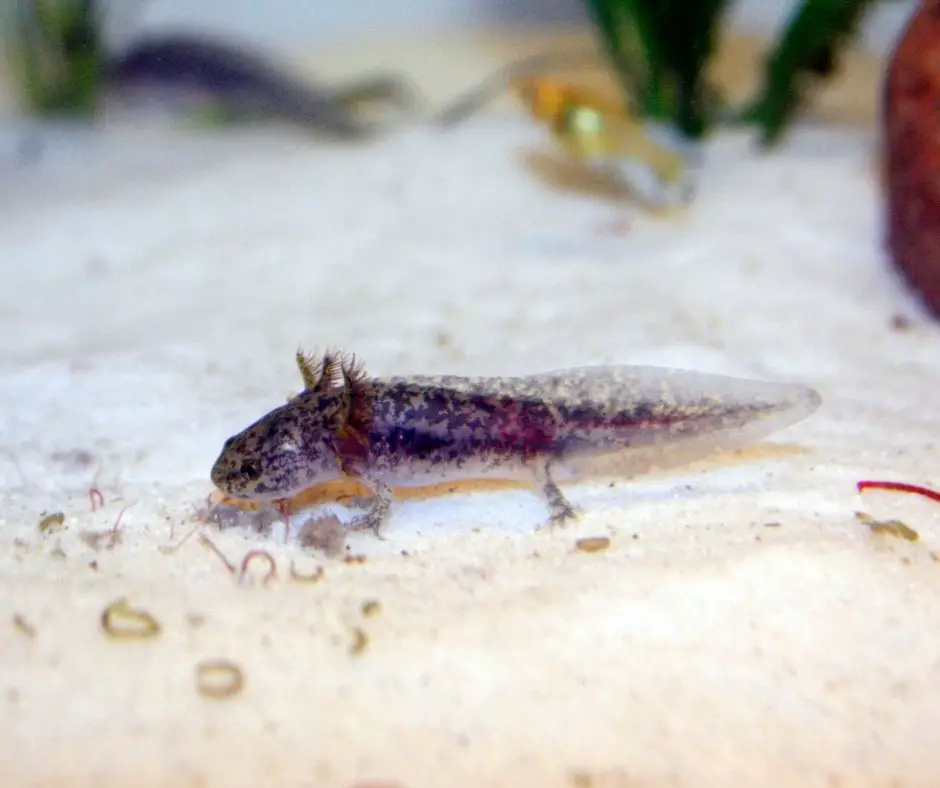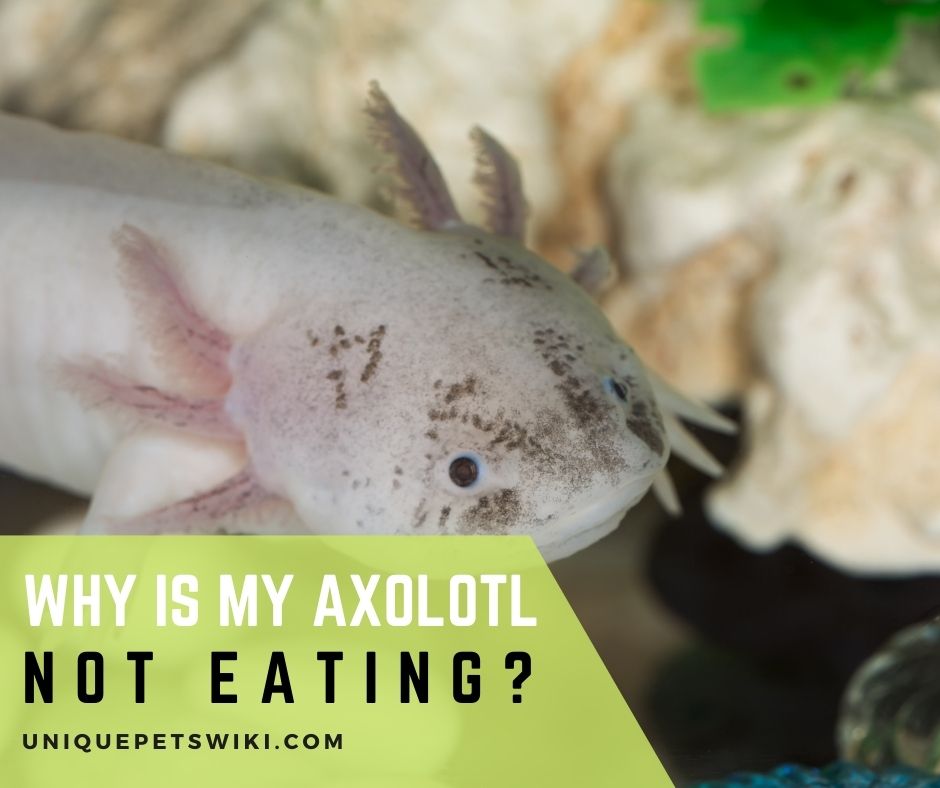Are you wondering ‘why is my baby axolotl not eating?’ Baby axolotls have a good appetite when they are healthy and most eat two times a day. After all, they need that fuel to grow, thrive, and explore the world around them.
If your juvenile axolotl has suddenly stopped eating, it is natural for you to feel concerned.
However, most of the time, axolotls self-regulate. Not eating might simply be a phase they undergo and most of them bounce back to their normal appetite.
In this guide, we will cover the main reasons why a baby axolotl might stop eating and also their solutions.
Contents
Why Is My Baby Axolotl Not Eating?
If your baby axolotl has suddenly stopped eating, it may be due to changes in the water parameters. Healthy juvenile axolotls eat every day and they usually have a good appetite.
It could also be that your little pet is simply picky or fussy and needs a food change. Sometimes, there may infection or disease affecting its appetite.
Depending on the exact cause, the issue could be serious or just a phase your pet may be going through.
Let us cover these reasons in detail.

New Tank
When you first buy a baby axolotl and set up its tank, you have to pay careful attention to the nitrogen cycle. The nitrogen cycle provides a happy and healthy environment for your baby axolotl.
Firstly, you should only move your new axolotl into a properly cycled tank. This means the tank should have optimum levels of ammonia, nitrates, and nitrites.
Often, a baby axolotl that has been recently moved into a new tank might spend some time acclimatizing to it.
This new environment could be stressing your young pet and that might explain its lack of appetite.
So, give your pet some time to settle down. If needed, keep in touch with the breeder/store from where you purchased the axolotl and follow their instructions regarding the safe transfer of your axolotl to its new tank
Your Axolotl is Not Hungry
A simple explanation behind why a baby axolotl suddenly stops eating is that it is not hungry.
Most healthy baby axolotls eat twice a day. However, some may eat only once per day. It also depends on ‘how much’ your baby axolotl eats each time.
Some axolotls eat more in one sitting whereas others might eat smaller portions through several feedings.
It is best not to feed a baby axolotl more than twice per day. This will give your pet a chance to digest its food. So, always schedule regular feeding times and follow the schedule strictly.
Also read: Baby Axolotl Care
Wrong or Bad Food
It is important to consider what you are feeding your baby axolotl. Has your pet always shown ‘pickiness’ when it comes to eating the food you feed it? Perhaps your little one does not like the taste or texture of that food.
It may be spoilt or expired and that could be a reason why your pet has suddenly started turning its nose up against it.
You could switch to another brand of high-quality axolotl pellets. Of course, you must make the change gradually to prevent any gastric troubles.
Please note that many juvenile axolotls prefer live food and most of them dislike dead, dehydrated, dried, and frozen worms or food pellets.
Also, picky axolotls prefer if you feed the live worms right in front of their mouths so they can quickly gobble it up. This is because axolotls are inherently opportunistic feeders.
You could try feeding fresh live worms to your tiny pet right near its mouth and see if it makes a difference.
Stress
Several factors can cause stress in young axolotls. A new aggressive tank mate, bright lights, or a small or crowded tank could all trigger stress in all axolotls and especially the younger ones.
Stress is one of the main reasons behind appetite loss in axolotls. Check out the signs of stress in axolotls in our guide here.
To prevent stress in axolotls, make sure to provide it with a large tank ( at least 20 gallons for one axolotl and 70 to 100 gallons for two axolotls).
It is important to place the tank in a dark place without bright lights. Axolotls are nocturnal creatures that rest during the day. They could get stressed if lights or natural daylight is keeping them awake during the daytime.
Bad Water Conditions
Very warm water, too much ammonia, or nitrites in the water can also cause a lack of appetite in a baby axolotl.
Conversely, very cold water can slow down your baby axolotl’s metabolism, causing it to eat less and move less than normal. Axolotls thrive when their water is between 60-64 F (16-18 deg C).
Other water parameters should ideally be ammonia 0 ppm, nitrites 0 ppm, and nitrates <40 ppm. The water pH should be 7.4 to 7.6.
Do check out our guides on Axolotl Water Conditions and Best Axolotl Temperature to learn more.
API FRESHWATER MASTER TEST KIT 800
- Contains one (1) API FRESHWATER MASTER TEST KIT 800-Test Freshwater Aquarium Water Master Test Kit, including 7 bottles of testing solutions, 1 color card and 4 glass tubes with cap
- Helps monitor water quality and prevent invisible water problems that can be harmful to fish and cause fish loss
- Accurately monitors 5 most vital water parameters levels in freshwater aquariums: pH, high range pH, ammonia, nitrite, nitrate
- Designed for use in freshwater aquariums only
- Use for weekly monitoring and when water or fish problems appear
Last update on 2022-12-30 / Affiliate links / Images from Amazon Product Advertising API
Impaction
Impaction in axolotls is a serious condition and it can affect young axolotls since they tend to eat sand and gravel.
These foreign bodies could cause an intestinal blockage resulting in symptoms like severe constipation, bloating, complete lack of appetite, immobility, pain, and general ill-health.
Fridging is the best way to treat axolotl impaction. In fridging, you move your axolotl into a container with cool, dechlorinated water. The cool water stimulates its bowels and might help your pet poop.
In severe cases, axolotls with an impaction might need surgery to remove the blockage.
Illness or Infection
A sick axolotl will also not eat. Diseases like fungal or bacterial infections as well as liver or kidney failure are sometimes seen in axolotls.
In addition to a lack of appetite, other symptoms of sickness in axolotls include gill deterioration, immobility, skin lesions, injuries or wounds on the body, a lack of balance while swimming, etc.
If you have noticed these signs along with a lack of appetite, please consult an aquatic vet to rule out health issues.

What Do I Do If My Baby Axolotl Won’t Eat?
As you can see, there are many reasons why a baby axolotl suddenly displays a lack of appetite. Here are some steps you can take to remediate it:
Try some dietary changes – Your little pet might simply be a fussy eater. Try making some food changes like feeding directly in front of its mouth, switching to high-quality pellet food, or feeding live worms.
Keep trying until it eats. Some babies do not like freeze-dried foods. Try soaking the food for a bit so your pet finds it more palatable.
Give it time – if you have just got your baby axolotl, it may be stressed. Let it acclimatize to the new tank. Switch off the ambient lights and let it get used to its new surroundings. Try feeding it again after 24 hours.
Keep an eye on its tank mates – yes, there could bullying in the aquatic world too. Ensure that the other tank mates are not eating your little one’s food.
Maybe it is eating! – Sometimes, your pet might be eating but you might not actually see it eating.
Reduce the number of feedings to twice a day and give your pet some time to digest what it has eaten. It is important not to overfeed as that too could cause problems.
Make small water changes – Often, making a small water change is all that may be required to get your baby axolotl to eat.
Keep checking water parameters from time to time. Ensure that the water temperature is not too cold as that could slow down its metabolism and cause it to eat less.
Make sure your pet is not sick – watch out for signs of stress, impaction, or disease. If you notice any lesions, constipation, or deteriorated gills, take action quickly to treat it.
How Long Can A Baby Axolotl Go Without Eating?
In the wild, axolotls are known to go without feeding for nearly 2 weeks. However, baby or juvenile axolotls need frequent meals since they also burn more energy for growth.
Most baby axolotls cannot survive for long without food.
Let your baby axolotl ‘fast’ for a day then try feeding it some fresh live earthworms or nightcrawlers right near its mouth.
If your pet still refuses food, then check its water parameters. If those are fine, take your pet to the vet to rule out underlying health issues.
Check out our guide on How long can axolotls go without food?
Axolotl Not Eating and Related Problems
Here are some common problems related to axolotl’s appetite:
Not eating and being too skinny
A colorless and skinny axolotl indicates malnourishment. Try changing the food – usually, live worms directly near its mouth. This will surely make a difference. Switch to high-quality pellets.
If that does not work, check water parameters and rule out underlying infections or diseases.
Your axolotl could be constipated or impacted. Fridging can help in both cases. Cold, dechlorinated water stimulates bowel movement. If not, take it to the vet for surgery to treat impaction.
Floating and not eating
High ammonia, warm water, and bad water conditions are usually the causes of floating. Make small water changes. Test the water. If this does not work, make sure there is no infection causing these symptoms.
Conclusion – Why Is My Baby Axolotl Not Eating?
A baby axolotl might not eat if it is still digesting its food. Sometimes, a new tank or poor water conditions could result in a lack of appetite.
A picky or fussy eater might not like pelleted food or dehydrated/dry worms. Switching to live/fresh worms could help. In extreme cases, a disease may be the cause of appetite loss.
We hope this guide answers the question: ‘why is my baby axolotl not eating?’ and helps you find the solution.

